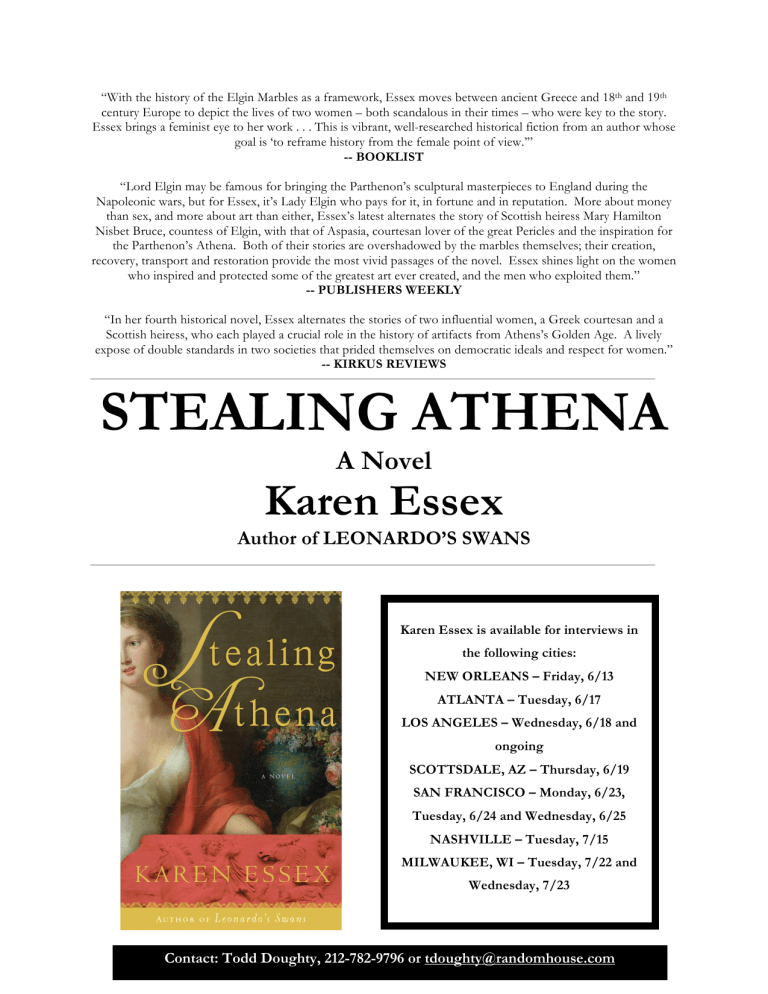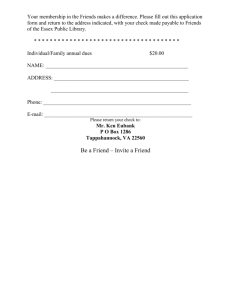stealing athena

“With the history of the Elgin Marbles as a framework, Essex moves between ancient Greece and 18 th and 19 th century Europe to depict the lives of two women – both scandalous in their times – who were key to the story.
Essex brings a feminist eye to her work . . . This is vibrant, well-researched historical fiction from an author whose goal is ‘to reframe history from the female point of view.’”
-- BOOKLIST
“Lord Elgin may be famous for bringing the Parthenon’s sculptural masterpieces to England during the
Napoleonic wars, but for Essex, it’s Lady Elgin who pays for it, in fortune and in reputation. More about money than sex, and more about art than either, Essex’s latest alternates the story of Scottish heiress Mary Hamilton
Nisbet Bruce, countess of Elgin, with that of Aspasia, courtesan lover of the great Pericles and the inspiration for the Parthenon’s Athena. Both of their stories are overshadowed by the marbles themselves; their creation, recovery, transport and restoration provide the most vivid passages of the novel. Essex shines light on the women who inspired and protected some of the greatest art ever created, and the men who exploited them.”
-- PUBLISHERS WEEKLY
“In her fourth historical novel, Essex alternates the stories of two influential women, a Greek courtesan and a
Scottish heiress, who each played a crucial role in the history of artifacts from Athens’s Golden Age. A lively expose of double standards in two societies that prided themselves on democratic ideals and respect for women.”
-- KIRKUS REVIEWS
______________________________________________________________________________________________________________________________________________________
STEALING ATHENA
A Novel
Karen Essex
Author of LEONARDO’S SWANS
______________________________________________________________________________________________________________________________________________________
Karen Essex is available for interviews in the following cities:
NEW ORLEANS – Friday, 6/13
ATLANTA – Tuesday, 6/17
LOS ANGELES – Wednesday, 6/18 and ongoing
SCOTTSDALE, AZ – Thursday, 6/19
SAN FRANCISCO – Monday, 6/23,
Tuesday, 6/24 and Wednesday, 6/25
NASHVILLE – Tuesday, 7/15
MILWAUKEE, WI – Tuesday, 7/22 and
Wednesday, 7/23
Contact: Todd Doughty, 212-782-9796 or tdoughty@randomhouse.com
FOR IMMEDIATE RELEASE
On-sale date: June 17, 2008
Contact: Todd Doughty
212-782-9796
tdoughty@randomhouse.com
MORE PRAISE FOR KAREN ESSEX AND LEONARDO’S SWANS :
“Privileged sisters compete over men, attention, and the chance to be immortalized on canvas by Leonardo da Vinci in this instantly absorbing tale.”
-- Redbook Magazine
“In this sizzling historical novel set in 15 th -century Italy, Essex combines art, political intrigue, family feuds and sex to create a page-turner that also probes the experience of being painted and whether it can offer immortality.”
-- USA Today
“Sexual and political intrigue drive Essex’s intricate novel ... the stories of Isabella and Beatrice d’Este along with the occasional investigation of Leonardo’s artworks, methods and personality are always engrossing.”
-- Publisher’s Weekly
“Acclaimed author Karen Essex spins a wild yarn about sexual politics and the struggle for immortality.”
--Harper’s Bazaar
_____________________________________________________________________________________________________________________________________________________
STEALING ATHENA
A Novel
Karen Essex
_____________________________________________________________________________________________________________________________________________________
With her new novel, STEALING ATHENA (Doubleday; June 17, 2008; $22.95), internationally bestselling author Karen Essex crafts the story of two extraordinary women separated by centuries to reveal the passions, ambitions, and controversies surrounding one of the world’s most treasured and fought over collections of art—The Elgin Marbles.
At the height of the Napoleonic Wars, 21-year-old Scottish heiress and newlywed Mary Nesbit,
Countess of Elgin, leaves behind her home and family in the recently formed United Kingdom to travel the rough seas to Turkey. Her husband, Lord Elgin, the British Ambassador to
Constantinople, must reassure the Sultan of Turkey that his alliance with England will hasten
Napoleon’s defeat in the Ottoman territories.
Yet Mary soon learns that Lord Elgin has a secondary mission and obsession: to deconstruct the
Parthenon in Athens and bring its magnificent sculptures to England. Elgin believes that the British
Empire must compete with Napoleon, who is presently filling the Louvre with the treasures of Italy and Egypt, and that exposure to Greece’s most spectacular ruins will elevate the fine arts of Britain.
Little does Mary know how integral her personal fortune is to Elgin’s grandiose scheme.
As Elgin’s plans for the Parthenon come to fruition, Mary fears that his ambitions will overshadow his ambassadorship and cost outrageous sums of money. However, wishing to help her husband become the great man he believes he is destined to be, she uses her cunning and her charms to obtain permission from the fearsome Ottoman power brokers to secure the marbles for the glory of
England.
Two millennia earlier during Athens’s Golden Age, the philosopher Aspasia of Miletus is forced to come to Athens with her sister and brother-in-law, Alkibiades, a man who despises her brazen ways.
After threatening to rape her and sell her to a brothel, he eventually gives her away to Perikles, a visionary politician with plans to transform the Acropolis.
As Perikles’ courtesan, Aspasia defies Athens’ punishing restrictions on women and becomes known for her wisdom, as well as for her influence on Perikles, who greatly admires her political acumen.
But Aspasia also faces public scorn for her perilous unmarried status and becomes an easy target for her lover’s enemies. His plan to build the Parthenon is mired in controversy, but Aspasia shares
Perikles’ vision for a monument to Athena that will not only remind the Athenian people of their greatness, but the entire world as well.
In parallel stories that resonate hauntingly, Aspasia stands with Perikles and the genius sculptor
Pheidias at the center of accusation and dispute as the Parthenon rises despite its detractors, while
Mary—for both love and patriotism—witnesses and finances the glorious building’s deconstruction.
Though living centuries apart, both women defy the conventions of their day, and both pay dearly for their acts of independence. Aspasia faces an Athenian jury after being indicted on trumped up charges of impiety and conspiring to draft women into prostitution. Mary is subject to a bitter and public divorce trial—with devastating personal ramifications—that becomes an infamous tabloid obsession.
With the British and Greek government currently battling over the rightful ownership of The Elgin
Marbles, this centuries-old story is more relevant than ever before. A new Acropolis museum with a stunning gallery built to house the marbles upon their return has been completed and is set to open in 2008. Many countries and organizations are joining the Greeks in their outcry to regain possession of these great treasures; however, at this time, The Elgin Marbles remain firmly ensconced in the British Museum.
Based on copious amounts of research into these two fascinating time periods as well as presenting an intimate look at the secretive world of the Ottoman Empire, STEALING ATHENA is a smart, sexy, historical novel in which two women defied the social conventions of their day and impacted the course of history.
For more information, please visit www.karenessex.com
or www.doubleday.com
STEALING ATHENA: A Novel
Karen Essex
Doubleday
On Sale Date: June 17, 2008
ISBN: 978-0-385-51971-7
Price: $22.95
ABOUT THE AUTHOR:
Karen Essex is an award-winning novelist, journalist and a screenwriter. She is the author of the best-selling novel, Leonardo’s Swans , about the rivalries among the powerful women painted by the great master when he was employed by the Duke of Milan. She has also written two acclaimed biographical novels about the queen of Egypt, Kleopatra and Pharaoh, which she adapted into a screenplay for Warner Bros. Essex also adapted Anne Rice’s novel The Mummy or Ramses the Damned into a screenplay for Titanic director James Cameron and 20th Century Fox, and has written a screenplay about Kamehameha, the first king of Hawaii, for Columbia/Tristar. Most recently, she has written a dance movie for Jennifer Lopez Entertainment and Paramount Pictures.
Essex’s articles, essays and profiles have been published in Vogue, Playboy, The L. A. Weekly, L. A.
Style, and many other periodicals. After being awarded highest honors from the Los Angeles Press
Club for her thought-provoking cover story about the missing 1950s pinup icon Bettie Page, Essex co-authored the biography, Bettie Page: Life of a Pinup Legend.
Essex is the first and only journalist with whom the reclusive Ms. Page has ever agreed to meet and cooperate.
Essex was born and raised in New Orleans. She graduated from Tulane University, attended graduate school at Vanderbilt University, and received an MFA in Writing from Goddard College in
Vermont. She has appeared on The Today Show and A Word on Words hosted by John Seigenthaler, as well as other PBS and NPR programs. She has lectured at the Chicago Museum of Art, and extensively at universities. Her books are taught in many college courses from creative writing to history to women’s studies.
Leonardo’s Swans, a runaway bestseller in Italy, won the prestigious 2007 Premio Roma for foreign fiction.
Essex’s novels are published in 25 languages. She lives in Los Angeles.
A LETTER FROM KAREN ESSEX
Dear Reader,
My novels are about women and power.
Throughout every historical era, dynamic women have influenced world events but history has rarely recorded their accomplishments. In fact, when my daughter was in grade school, she and her friends could not name any powerful women except…Madonna! Whether you are the mother or the father of a young girl, I’m sure that you find that as alarming as I did. At that point, I made it my goal to revive the stories of extraordinary women, highlighting the ways that they transformed the times in which they lived and the world beyond.
My new novel, STEALING ATHENA, chronicles the amazing journey of the Elgin Marbles— those controversial treasures taken from the Acropolis by Lord Elgin and placed in the British
Museum—through the dual narratives of Mary Nisbet, Elgin’s wife, a dazzling Scottish heiress, and
Aspasia, philosopher and mistress of Pericles during the Golden Age of Athens. In those heady days, Aspasia witnessed the construction of the Parthenon as she stood fearlessly with Pericles at the center of Athens’ power circle. Some 2300 years later, Lady Elgin used her money, her intelligence, and her beauty to negotiate with the rulers of the Ottoman Empire and the most commanding men in His Majesty’s realm to help Elgin realize his ambition of claiming the marbles for England.
Anyone interested in an intimate look at women’s lives in these two fascinating periods will enjoy STEALING ATHENA. It’s time for women—and men—to have a better sense of the vast and important contributions that women have made to our world. I guarantee that you’ll be as riveted to the two passionate love stories at the heart of the novel as I was when I was researching and writing it.
With warm regards,
Karen Essex
STEALING ATHENA: A Novel
Karen Essex
Doubleday
On sale date: June 17, 2008
ISBN: 978-0-385-51971-7
Price: $22.95
A CONVERSATION WITH KAREN
ESSEX
Q: How did you decide to write about the Elgin Marbles?
A: I first saw the Elgin Marbles in 2000 at the British Museum when I went to see an exhibit there about
Cleopatra. I was researching my novel Kleopatra and I wandered into the Duveen Gallery where the marbles are housed. I listened to the story behind the marbles on the audio guide and had an intuition that it would be good fodder for a novel. When Susan Nagel's biography came out in 2004, I eagerly read it and was blown away by Mary's contribution to the acquisition of the treasures, and also by the absence of references to her in the sources. I thought, hmmm, another woman who defied society's idea of how a woman should behave and paid a steep price for it—and was forgotten. I got very excited about writing about her.
Q: What did your research for Stealing Athena entail?
A: I am definitely a research freak. I'm the sort of writer who thinks that if she doesn't know everything, she doesn't know anything. Stealing Athena was difficult to write simply because of the enormity of the research.
It was crucial for me to understand the Ottoman Empire, the British Empire, Napoleon, the Golden Age of
Pericles, and all the ensuing cultural studies that would have impacted the people in those civilizations and epochs. I have posted a selected bibliography on my website.
Q: How long did it take you to research and write Stealing Athena ?
A: As I said, I started thinking about it in 2001, with interest heating up in 2004. Once I get an idea for a book, it’s never far from my mind, even if I am writing something else. Luckily, I studied ancient Greece both in graduate school and on my own for other projects, so I already had a solid base of knowledge for both the Golden Age of Pericles and for his mistress, my other heroine, Aspasia.
Q: You must become engrossed in the period of history and lives of the historical figures given your investment of time, research and writing. Is it difficult for you when you have finished to leave your characters behind?
A: Oh yes! I have often thought that I should do what other historical novelists do—specialize in only one time period. With my interests sort of sweeping all of history, it’s as if I have to earn a PhD every time I write a book. I put enormous—and I do mean enormous—time and energy into studying these cultures and constructing these characters, and then I have to forsake them for the next! It is indeed quite sad. I suppose that on the bright side, I am fortunate to be able to spend time with so many of history’s most fascinating people. I mean, I feel as if I’ve dated Julius Caesar, Mark Antony, and Pericles, and made good friends with
Aspasia, the Este princesses, Socrates, and Leonardo da Vinci. Kleopatra, well, let’s just say that we’re on very close terms.
Q: Do you think that history and fiction compliment each other in the writing process?
A: I do think that scholarship and fiction work together often in this way. A scholar brings new understanding to something from the past, and the fiction writer or dramatist is inspired to try to popularize it. It's common knowledge that Shakespeare wrote with a copy of Plutarch open on his desk (so do I!).
Q: The story of Lord Elgin and Mary Nisbet Elgin was rich enough to hold the plot of an historical novel. What made you decide to incorporate Aspasia and her story into Stealing Athena ?
A: I cannot explain how I decided to incorporate Aspasia's story into the narrative. I guess I just wanted to make my life a lot harder! I have long held an interest in Aspasia, and one day while I was lying on the floor, the idea to have Aspasia watch the Parthenon go up and have Mary watch it come down just descended upon me. I suppose that I love the classical Greek world above all time periods and feel very comfortable writing in that space.
Q: The jacket is so beautiful and illuminates what the reader will find inside the pages spendidly.
Did you have a role in the cover art design?
A: Just as our first impressions of people often prove to be accurate, I do believe that we can frequently judge a book by its cover, which is why I try to be as pro-active as possible in the design of my book covers. I am a very deliberate writer in that I know exactly what story I am trying to tell and what themes I wish to convey to a reader. It's crucial that a book cover reflect those things, and who would know better than me? My undergraduate work was in theatrical design. I'm a very visual person, and my books are often inspired by works of art. With both Leonardo's Swans and Stealing Athena , I knew which art should grace the covers before
I had written the books. The cover is the "face" of the book, if you will. A reader may not judge the book by its cover, but the reader cannot get inside the book without seeing and regarding the cover. Like faces, a cover is either alluring—or not.
Q: Can you tell me more about the painting and other elements on the jacket?
A: The painting on the cover of Stealing Athena is a self-portrait by the French painter Marie-Geneviève
Bouliard in which she envisioned herself as Aspasia. I selected it because it is an imagined portrait of one of my two heroines done by a female artist who was painting in the time period of my other heroine, Mary
Nisbet (circa 1794). Considering the dual narratives of my book, you can't get more perfect than that! The insertion of a small portion of the Parthenon frieze at the bottom was genius, as far as I am concerned. And
I also love the gilded Turkish trim that the designer uses at the top of the cover because it brings in another element of the book, which is its setting in Ottoman-ruled Turkey and Greece. I think the result is stunning. I think it's amazing that we were able to convey so many elements of the book in the cover design with visual clues alone.
Q: Is there a continuing theme for your novels?
A: My novels are about women and power. Throughout every historical era, dynamic women have influenced world events but history has rarely recorded their accomplishments. In fact, when my daughter was in grade school, she and her friends could not name any powerful women except…Madonna! Whether you are the mother or the father of a young girl, I’m sure that you find that as alarming as I did. At that point, I made it my goal to revive the stories of extraordinary women, highlighting the ways that they transformed the times in which they lived and the world beyond. It’s time for women—and men—to have a better sense of the vast and important contributions that women have made to our world.
Q: How are the stories of Aspasia and Mary Nisbet Elgin relevant to women today?
A: Aspasia lived some 2500 years ago, and Mary lived 200 years ago. You’d think they had little in common, but women’s issues and concerns remain constant through the millennia—relationships, birth control, pregnancy, child-rearing, the place of women in society, and women’s fundamental rights. I wrote about these two women because, firstly, their experiences resonate quite hauntingly, and secondly, because while women generally have more rights and status today, at least in much of the world, our concerns are the same as those women. Both Mary and Aspasia defied social convention, which also makes them extremely
identifiable to women today who have lived through so much social change. I am absolutely passionate about illuminating the truth of the female experience, and for many reasons, that truth remains quite static, I’m afraid.
Q: What are you working on now?
A: My next book will incorporate lore, mythology, and metaphysics, reflecting my interests in all those things.
It will again be historical fiction told from a female point of view, but it will also be quite a departure, though one that I believe my readers are pre-disposed to like. That’s all I can say at the moment.
Q: Do you think the Elgin Marbles should be returned to the Greek government? Is there an argument to be made for the Marbles to stay in the British Museum?
A: Prior to the opening in Athens of the stunning new Acropolis Museum with a spectacular gallery that faces the Parthenon, I think the British had a pretty good case. After all, Parliament put Lord Elgin through grueling hearings to determine if he acquired the marbles legally. (Whether he did remains a subject of fierce debate, but at least Parliament tried to do the right thing.) The British have been the marbles’ steward for two hundred years, and the British Museum is not only a fantastic and free museum where people come from around the world to visit, but it’s also a center for scholarly study. The British have made these treasures easily accessible to the world in a very democratic way for a very long time. That said, it is inescapable that these treasures should be reunited with the building for which they were created. I agree that returning the marbles does open a can of worms as far as setting a precedent for who owns what in the world of art. If this idea of returning everything to its place of origin is carried out to its logical conclusion, the Louvre and other museums like it will soon be virtually empty. No one wants that. But the marbles, because they were taken from a structure that is still standing, represent a special case. Plus, it’s an emotional thing. One simply senses that they must go home!
Q: The themes of ownership and possession are felt throughout Stealing Athena , both in an artistic
(with the Marbles) and relationship (Aspasia being a courtesan; Mary being an heiress) sense. Do you feel that both Mary and Aspasia reject or accept the conventional notions of ownership at the end of the novel?
A: Well, Mary was certainly passionate about retaining ownership of her fortune and retaining control over her body—both of which were at odds with the conventions of her day. In the early days of the 19 th century, a woman was literally and legally chattel—the property of her husband. In Aspasia’s time, the same was true.
I believe that both of these women embodied a sense of self-determination that was radical in their respective societies. That’s why they fascinate us, and frankly, why they fascinated people in their own epochs. Both attained notoriety, for sure. Both were wildly criticized and persecuted, but both received respect from very illustrious persons. These were women who wanted to transcend ownership and own themselves. And let’s face it, there are women in multiple cultures in the 21 st century who are still struggling with the very fundamentals of human rights and freedoms. Women—even privileged women—are still struggling to find their comfort zone in society.
Portions of this interview with Karen Essex were taken from a conversation with Lynn Rosen on holdencalling.blogspot.com.




